
An aide-de-camp is a personal assistant or secretary to a person of high rank, usually a senior military, police or government officer, or to a member of a royal family or a head of state.

Military police (MP) are law enforcement agencies connected with, or part of, the military of a state. In wartime operations, the military police may support the main fighting force with force protection, convoy security, screening, rear reconnaissance, logistic traffic management, counterinsurgency, and detainee handling.

The president of Sri Lanka is the head of state and head of government of the Democratic Socialist Republic of Sri Lanka. The president is the chief executive of the union government and the commander-in-chief of the Sri Lanka Armed Forces.
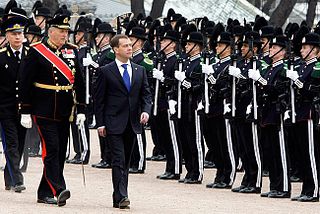
In some militaries, foot guards are senior infantry regiments. Foot guards are commonly responsible for guarding royal families or other state leaders, and they also often perform ceremonial duties accordingly, but at the same time are combat soldiers.
Security police usually describes a law enforcement agency which focuses primarily on providing security and law enforcement services to particular areas or specific properties. They may be employed by governmental, public, or private institutions. Security police are generally considered distinct from security guards as the former typically hold some level of law enforcement authority. The exact powers held by security police vary widely between jurisdictions. Examples of these types of agencies include the U.S. FBI Police, the Indian Central Industrial Security Force, and the British Civil Nuclear Constabulary.
Commandant is a title often given to the officer in charge of a military training establishment or academy. This usage is common in English-speaking nations. In some countries it may be a military or police rank. It is also often used to refer to the commander of a military prison or prison camp.
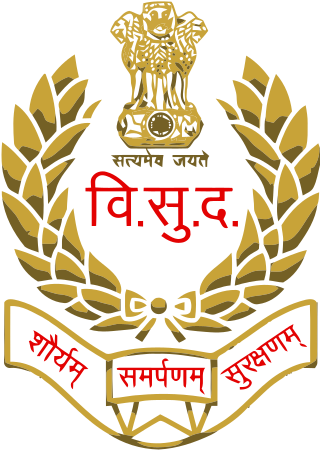
The Special Protection Group (SPG) is an agency of the Government of India whose sole responsibility is protecting the Prime Minister of India and, in some cases, his or her family. It was formed in 1988 by an Act of the Parliament of India. The SPG protects the Prime Minister at all times both in India and abroad, as well as the Prime Minister's immediate family members residing with them at their official residence. Family members, however, may decline security.

An aiguillette, also spelled aguillette, aiglet or aglet, is a cord with metal tips or lace tags, or the decorative tip itself.
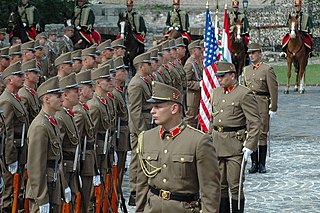
A guard of honour (GB), also honor guard (US), also ceremonial guard, is a group of people, usually military in nature, appointed to receive or guard a head of state or other dignitaries, the fallen in war, or to attend at state ceremonials, especially funerals. In military weddings, especially those of commissioned officers, a guard, composed usually of service members of the same branch, form the sabre arch. In principle, any military unit could act as a guard of honour. However, in some countries certain units are specially designated to serve as a guard of honour, as well as other public duties. Republican Guards, Royal Guards and foot guards frequently have ceremonial duties assigned to them.

The Presidential Security Force of Indonesia is one of the Central Executive Agencies of the Indonesian National Armed Forces responsible for proximate security and escort towards the head of state and VVIP in Indonesia, which includes the President, Vice President with their immediate families, former Presidents and Vice Presidents, and visiting foreign heads of state. Paspampres is based in Jakarta, and its personnel are drawn from deputized best-chosen officers, soldiers, seamen, marines, and airmen from special forces and/or special units within the Indonesian National Armed Forces (TNI). It is commanded by a two-star military general.

Provosts are military police (MP) whose duties are policing solely within the armed forces of a country, as opposed to gendarmerie duties in the civilian population. However, many countries use their gendarmerie for provost duties.
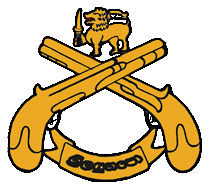
The Sri Lanka Corps of Military Police (SLCMP) is the branch of the Sri Lanka Army responsible for the policing of service personnel and providing a military police presence on service property, operations and exercises. It is made up of three regular regiments and with headquartered at Regiment Center Polhengoda, Colombo. Like other military police around the world, they continue to wear white webbing with barrack dress but white gaiters.

Sri Lanka Police is the civilian national police force of the Democratic Socialist Republic of Sri Lanka. The police force is responsible for enforcing criminal and traffic law, enhancing public safety, maintaining order and keeping the peace throughout Sri Lanka. The police force consists of 43 Territorial Divisions, 67 Functional Divisions, 432 Police Stations with more than 84,000 people. The professional head of the police is the Inspector General of Police who reports to the Minister of Law and Order as well as the National Police Commission. The current Inspector General of Police (Acting) is Deshabandu Tennakoon.
President's House is the official residence and workplace of the President of Sri Lanka, located at Janadhipathi Mawatha, Colombo, Sri Lanka. Since 1804 it had been the residence of British Governors and Governors-General and was known as the "King's House" or the "Queen's House" until Sri Lanka became a republic in 1972.
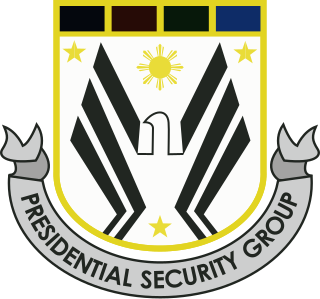
The Presidential Security Group, shortened as PSG, is a Philippine close protection agency. It is the primary agency concerned with providing close-in security and escort to the President of the Philippines, their immediate families, former presidents of the Philippines as well as visiting heads of state.

The President's Guard was a former unit of the Sri Lanka Army. It was responsible for the security of the President of Sri Lanka along with the President's Security Division which is the close protection agency of the President. It was made up of personnel from other regiments and units assigned for President's protection.
Prime Minister's Security Division (PMSD) is a unit of the Sri Lanka Police charged with the close protection of the Prime Minister of Sri Lanka. It is headed by a gazetted officer of the rank of Deputy Inspector General of Police (DIG). The unit consists of both uniformed and non-uniformed officers who provide close protection and guard Prime Ministerial residences.

Naval Patrolmen Branch is a branch of the Sri Lanka Navy that performs the role of naval infantry. Effectively members of this branch are soldiers of the navy. Originally limited for base and harbour security, in recent years Naval Patrolmen have taken part in offensive and defensive operations against the LTTE in conjunction with the Sri Lanka Army or independently, using both infantry and light armored units. It has also taken part in amphibious operations.

The United States Secret Service Uniformed Division is the Federal police force of the U.S. Secret Service, similar to the U.S. Capitol Police or DHS Federal Protective Service. It is in charge of protecting the physical White House grounds and foreign diplomatic missions in the District of Columbia area.














